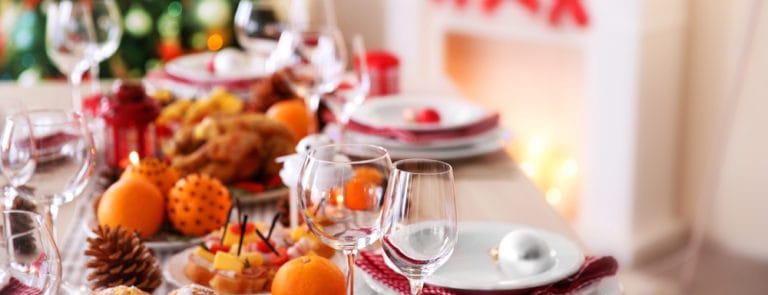15% off €35 OR 20% off €45
How to make Christmas dinner healthier

If you’re trying to lose weight or simply don’t want to put weight on over Christmas, you should aim to make your Christmas dinner as healthy as possible.
If you’re in charge of cooking for your family or loved ones, you’ll have complete control but if you’re only a guest, you’ll probably have to make some hard decisions when you head to the table.
9 ways to make Christmas dinner healthier
Read on to find out our favourite tips for making healthier Christmas dinners...
-
Choose a healthy starter
With a typical prawn cocktail having around 300 calories, you may want to see if you can serve up something that is just as delicious but has less calories.
There are many different homemade soups that you could make which have between 150 – 180 calories per portion or you could opt for a melon boat which only has around 50 calories.
-
Don’t add much salt
A typical Christmas dinner can contain 15g of salt if you’re not careful.
That’s twice the recommended maximum daily amount. To cut down on salt you should avoid pre-prepared vegetables and meat joints.
Cooking fresh is much better because you’ll know exactly how much salt you’re using.
-
Think about portion sizes
It can be easy to cook enough food to feed an army but you should try your best to only cook what you need, otherwise, you’ll be encouraging your guests to overeat.
If you’re only having five guests over, you shouldn’t need to cook more than ten pigs and blankets as they’ll have plenty of other things to eat.
Not sure how much of each food to serve up? Check out our article on how many portions of fruit and veg a day for more of an insight on portion sizes.
-
Cook lots of different vegetables
If you don’t smother vegetables in butter, they’re low in fat so try to give your guests a wide selection.
If you’re going to be sending out food to the table and letting people help themselves, send the vegetables first so they take bigger portions.
-
Limit the roasties
Instead of offering a mountain of roast potatoes, which have 149 calories per 100g, serve up a smaller amount alongside baked potatoes (109 calories per 100g) or mashed potato (98 calories per 100g).
Or if you’re not keen on giving up your roasties, try to reduce the amount of oil you use in the process to lower the number of calories and fat.
-
Watch how you cook your turkey
Turkey meat is low in fat but you need to cook it in its own juices if you want to avoid adding on extra calories.
Not putting butter under its skin and not cooking it in goose fat can make a big difference.
Before you serve your turkey, make sure you cut off all the skin which is high in fat and pop it straight into the bin so you’re not tempted to eat it later.
-
Dessert or cheeseboard
Having several dessert options and a cheeseboard straight after the main course can be a bit excessive because your guests will be feeling full from their starters and main courses.
Why not let everyone relax for an hour or two and then serve the cheese board and desserts? Alternatively, why not opt for one or the other.
Instead of buying a Christmas pudding, you could serve up a healthy homemade one with low-fat yoghurt or custard instead of brandy sauce.
Try to read the labels when choosing which cheeses to include on your board.
For instance, blue stilton has more calories and salt per portion compared to wensleydale with apricots.
-
Limit your alcohol intake
While a big glass of Baileys can be tempting, if you’re trying to be healthy this Christmas you might want to pass on this one.
The same goes for wine, beer and cocktails – as these drinks can increase your calorie intake by a fair amount, without you realising it!
For example, one 175ml glass of wine contains approximately 133 calories and one pint of beer has 239 calories.
-
Try to avoid sugary drinks
Since we’re on the topic of drinks, it might be worth skipping on the sugary concoctions too.
Like with alcoholic drinks, sugary beverages are also pretty calorific – which isn’t ideal if you’re trying to stay in a calorie deficit on the big day.
Instead, enjoy your Christmas dinner with a glass of water for a healthier hydrating option!
The final say
Feeling more positive about having a healthy Christmas dinner?
With these little tips and tricks, you can enjoy dining on the big day without having to worry about becoming derailed from your diet.
Last updated: 2 November 2021



